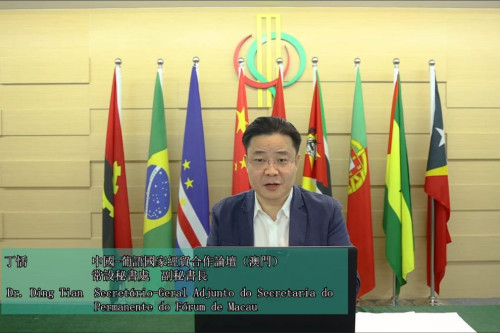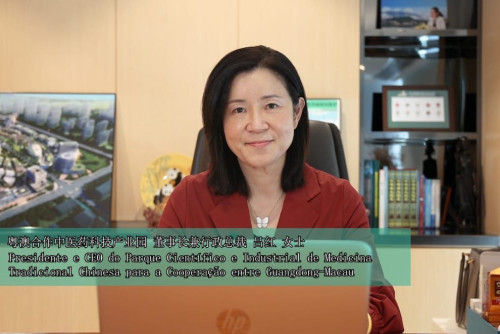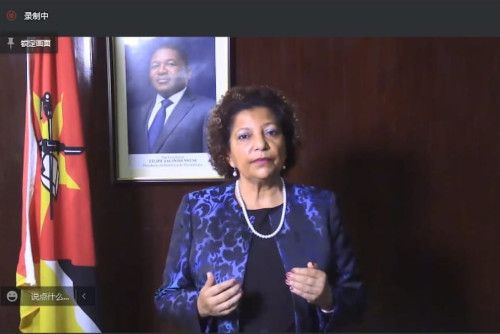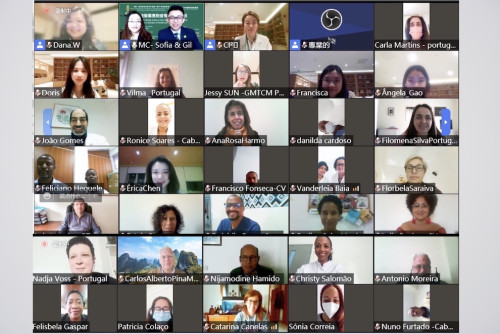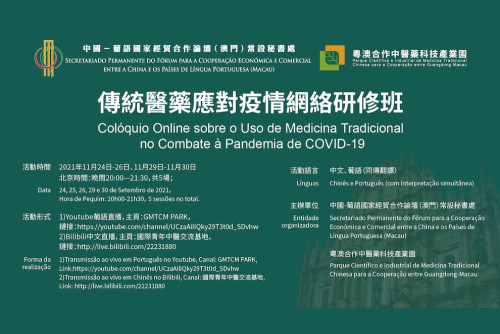The Permanent Secretariat of Forum Macao held with the collaboration of the Guangdong-Macau Traditional Chinese Medicine Technology Industrial Park the first session of an online training course on the use of traditional medicine to tackle COVID-19. The training course was supported by the Macao SAR Government Health Bureau, and the State Administration of Traditional Chinese Medicine of the People’s Republic of China.
The course’s opening ceremony took place online on November 24, at 8 pm (Beijing time). Deputy Secretary-General of the Permanent Secretariat of Forum Macao, Mr Ding Tian; Chairman of the Guangdong-Macau Traditional Chinese Medicine Technology Industrial Park, Ms Lu Hong; Deputy Minister of Health of Mozambique, Ms Lídia de Fátima da Graça Cardoso; and Representatives from the Portuguese-speaking Countries to the Permanent Secretariat of Forum Macao, took part in the opening ceremony, and each delivered a speech.
In his remarks, Mr Ding said the Permanent Secretariat of Forum Macao paid great attention to the traditional medicine sector. This sector was prominently featured in the Strategic Plan for Economic and Trade Cooperation signed at each edition of the Ministerial Conference of Forum Macao, and it was also considered an important driver in Macao’s effort for economic diversification.
He stated that this year was the sixth straight year that the Guangdong-Macau Traditional Chinese Medicine Technology Industrial Park had helped organise a training course on traditional medicine. The Industrial Park, as an important base for Macao to develop the traditional medicine industry, also contributed to strengthening the city’s role as an exchange and cooperation platform between China and the Portuguese-speaking Countries in this field. With the continuous implementation of the Master Plan for the Development of the Guangdong-Macao Intensive Cooperation Zone in Hengqin, the Industrial Park could take advantage of the fresh opportunities from the development of Hengqin, and of the Guangdong-Hong Kong-Macao Greater Bay Area, in order to boost cooperation between China and the Portuguese-speaking Countries in the traditional medicine sector.
The online course consists of five scheduled sessions from November 24 to 30, with a focus on international cooperation in the fight against the COVID-19 pandemic. Medical specialists and practitioners have been invited to share their respective experience on healthcare, the use of traditional medicine, and prevention efforts regarding COVID-19, with a focus on therapeutic plans using traditional medicine to treat after-effects from COVID-19. It is hoped that the trainees and representatives taking part in the online course can take full advantage of this opportunity to: conduct in-depth discussions and mutual learning, in order to promote cooperation and exchanges; deepen the collaboration in the use of traditional medicine in medical technology; and discuss applied practice, and the promotion of clinical experiences as a way to tackle public health challenges; as well as help ensure the good health of people in each of the participating countries.
The online training course on the use of traditional medicine is held via videoconference, broadcast internationally using the online platforms VooV Meeting, YouTube, and Bilibili. About 200 health officials and technicians from Portuguese-speaking Countries have enrolled for the training sessions, namely from Angola, Cabo Verde, Guinea-Bissau, Mozambique, and Portugal. As part of the programme, experts from each of those five Portuguese-speaking Countries have been assigned lecture roles focused on the status of the COVID-19 pandemic in their respective nations, including discussion of measures implemented to tackle the pandemic.
The Director of the Centre for Disease Control and Prevention at Macao’s Health Bureau, Dr. Lam Chong, discussed Macao’s response regarding the prevention and control of COVID-19. During the course, participants have been carrying out in-depth exchanges while getting to know more about the pandemic situation in Mainland China and Macao, including prevention and control measures regarding COVID-19. They have also been looking into how traditional medicine can be used to support the fight against the pandemic in each of their countries, while contributing to the boosting of post-pandemic economic recovery.
The course not only demonstrates the efforts between China and Portuguese-speaking Countries in the fight against the pandemic, but it also represents a further step towards the deepening of cooperation ties between China and Portuguese-speaking Countries, and the strengthening of Macao’s role as a platform.




